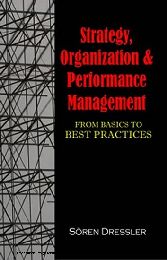Suchen und Finden
4 The Framework of Organizational Effectiveness (P. 55-56)
It appears to be impossible to develop one common framework or concept that describes organizations as objective phenomena. Organizations are constructs and not concepts. That means they cannot be described as clearly as tangible concepts and, therefore, are a kind of mental abstraction that needs interpretation.3 Along with other constructs such as leadership, motivation, and knowledge management, there is no absolute right or wrong, true or false, or dos and don.ts in organization management.
However, Organizational Effectiveness has driven companies to top performance, but there is no concept to determine the state of effectiveness upfront. It relies on the capacity to connect achieved performance with existing organizational patterns and to predict how these patterns will work for a company and its specific challenges in the future. This gap will be closed by a holistic and integrating approach to Organizational Effectiveness. Business today has radically changed its face compared to the mid-1980s . There are numerous trends that require a more proactive management of organizations:
• Plurality of management paradigms - There is no one single, successful management paradigm unilaterally applied across the business world.
• Globalization - Literally most industries and their major players are operating on a global basis.
• Digitization - Business interactions today are vastly supported by modern, digitized technologies.
• Flexibility - Organizations. paradigms have to enable flexibility in a business world that is far more uncertain than decades ago.
• Shorter Planning Horizons - Product life cycles are getting shorter and business models are mostly built on radically reduced break-even periods.
• Stakeholder - The shareholder has emerged as a dominating stakeholder group; companies today are scrutinized with regard to their corporate citizenship role and attractiveness as employers.
Since social and business sciences have not provided a comprehensive definition of Organizational Effectiveness, as of today there is a need to outline a comprehensive, integrated, and holistic approach. The framework of Organizational Effectiveness here is built around five categories:
• Organizational Context
• Corporate and Business Unit Structure
• Organizational Infrastructure
• Team and Individual Capabilities
• Performance Measurement and Target Setting
Each category covers a certain perspective of organization management and they are all interrelated. The Organizational Context describes the backbone of the business activities.
Alle Preise verstehen sich inklusive der gesetzlichen MwSt.








